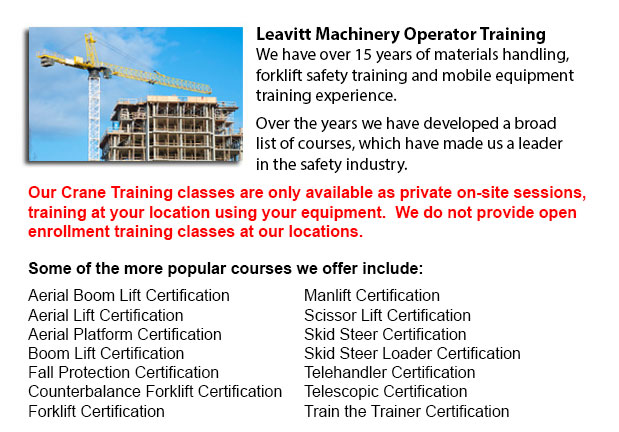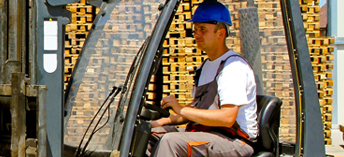
Crane Operator Certification Brampton - The process to enable people in order to operate certain types of cranes is to take crane operator certification training to be given certification. The certification process incorporates hands-on practice, classroom learning and an aptitude evaluation. Various training programs are existing for overhead cranes, mobile cranes, boom trucks, tower cranes, forklifts and several hoisting machines. Trainees will learn the fundamentals of equipment characteristics, safety, and operational practices associated with these kinds of cranes.
Customized Practical Training and Evaluation:
The on-site practical evaluation and training can be customized by each business following the in-class session. At any time, two operators will be trained by an instructor. The duration of time needed for training would differ depending on machine type and the employees' levels of ability, but generally requires an hour or two. The training will center on practical skills like for example safe operating practices, planning the lift and right rigging practices. Employers should schedule the on-site session earlier.
After in-class instruction, practical operating instruction and evaluation, and written test, the trainee would be given an individual wallet certificate and the company will be given a wall certificate. To get certification, trainees have to have an 80% passing score on both practical and written exams.
The program consists of: Regulations and policies, guidebooks; hazards of high voltage; safety concerns; emergency rescue procedures; signals and communications; pre-operational inspection; components, terms and types; pre-lift set-up and planning; crane configuration and capacity; wire rope and rigging; hammerhead / luffing jib crane operations; climbing cranes; fall protection; WHMIS; crane maintenance and First aid & CPR.
To become an overhead crane operator, the minimum requirements consist of possessing the mental and physical capability needed to carry out crane work. The fundamental capabilities which are required comprise a normal field of vision, depth perception, reaction time, coordination and manual dexterity. Prospective operators should not have the tendency to become dizzy. Operators who do not already have proof of qualifications and experience need to obtain certification. Operators need to be qualified to operate the specific kind of machine which they would be using to perform their job.
-
Boom Lift Operator Training Brampton
Boom Lift Operator Training Brampton - A cherry picker is a type of aerial work platform. Cherry pickers consist of a platform or bucket at the hydraulic lifting system's end. The device is also called a man lift, boom lift, basket crane or hydraladd... More -
Forklift Instructor Training Brampton
Forklift Instructor Training Brampton - For those lift truck operators who want to become a forklift instructor it is recommended that they complete a forklift Instructor training certification program. Entry qualifications for the forklift instructo... More -
Manlift Certification Brampton
Manlift Certification Brampton - The Manlifts and Elevated Platforms program offers training on the regulations, rules and correct application of safe operating measures and work practices involved in daily activities for those who work using this ma... More -
Telehandler Training in Brampton
Telescopic handlers normally called telehandlers for short, are a really popular piece of heavy construction equipment. They are usually used in the construction and agricultural trades. These machines have farthest reaching capacity and are able to... More -
Order Picker Training Brampton
Order Picker Training Brampton - The order picker lift truck allows for people working in a warehouse setting to lift pallets making use of forks. This electronically-powered machinery is also referred to as a stock picker and is similar to a forklif... More -
Zoom Boom Ticket Brampton
Zoom Boom Ticket Brampton - Zoom Boom Training focuses on correctly training prospective operators on variable reach forklifts. The training objectives include gaining the knowledge of the equipments physics and to be able to define the tasks of the... More -
Crane Training Schools Brampton
Crane Training Schools Brampton - Our different Mobile Crane Operation programs are meant for experienced operators who requires re-certification or certification, and for inexperienced people who are searching for their first job as a crane operator... More -
Crane Safety Training Brampton
Crane Safety Training Brampton - Both crane operator as well as their employers need to be aware of all the potential problems associated to the use of an overhead crane. All across North America, there is legislation which provides rules for the saf... More

Forklift Training Brampton
TOLL FREE: 1-888-254-6157
Brampton, Ontario
forklifttrainingbrampton.ca
Email Us
About Us


